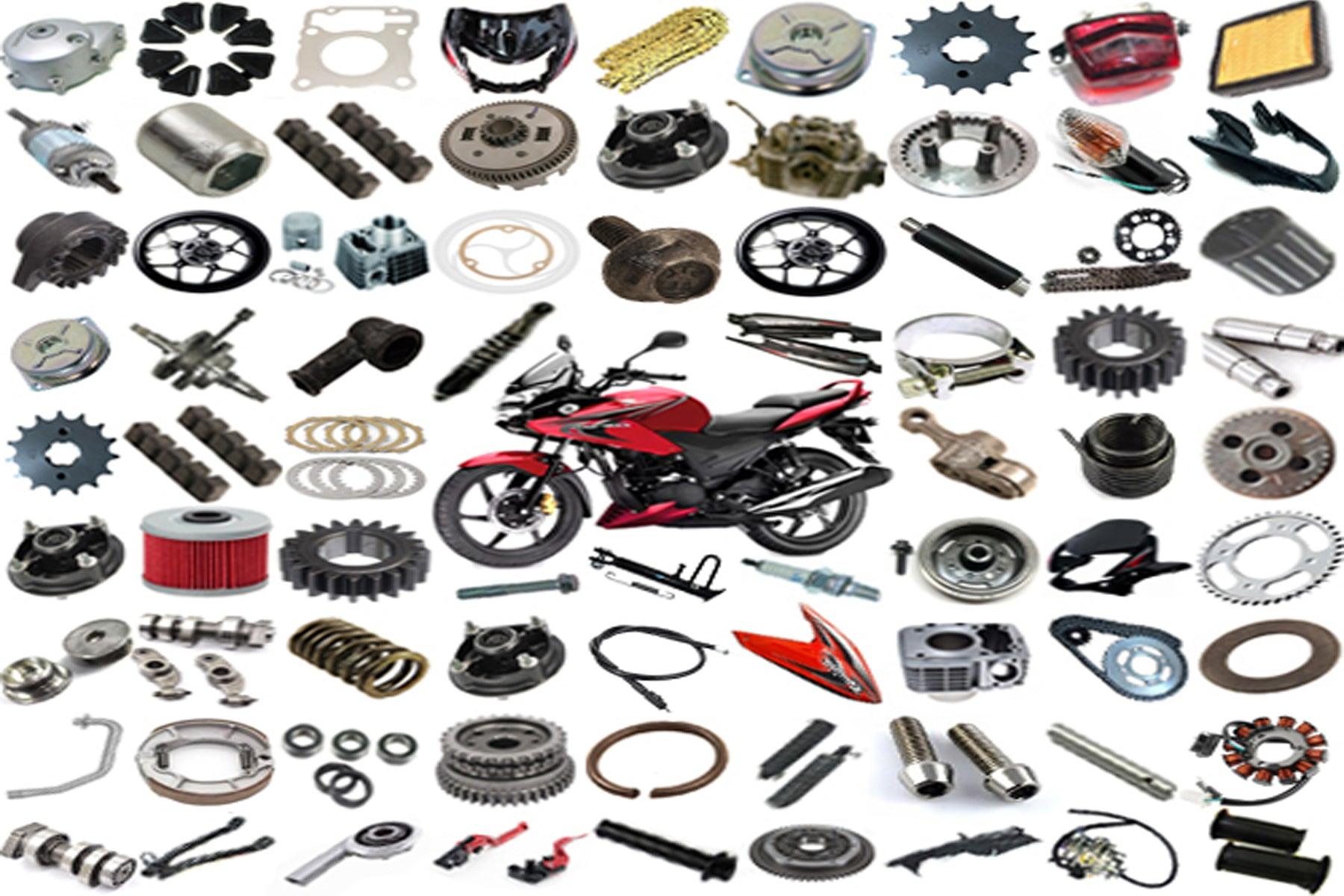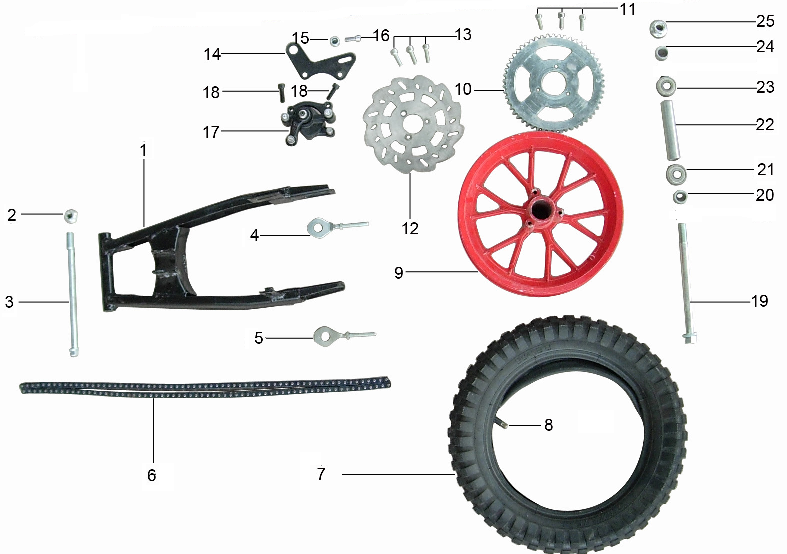How to Tell If Your Motorbike Components NZ Are Causing Performance Loss
How to Tell If Your Motorbike Components NZ Are Causing Performance Loss
Blog Article
Discover the Crucial Motorcycle Parts You Need for Optimal Performance
Recognizing the vital parts of a motorcycle is essential for achieving peak efficiency. Each element, from the engine to the braking system, plays a crucial role in overall functionality and safety and security. Routine upkeep can avoid unanticipated failings and boost the riding experience. Lots of motorcyclists overlook the intricacies of these systems. Discovering exactly how they interact can bring about a much more reliable ride. What crucial parts should every rider focus on?
The Engine: The Heart of Your Bike
The engine acts as the core part of a motorbike, driving its efficiency and specifying its abilities. It is in charge of transforming fuel right into power, which powers the bike forward. Different sorts of engines are employed, including single-cylinder, V-twin, and inline configurations, each offering distinct qualities matched for various riding styles and functions. The engine dimension, typically gauged in cubic centimeters (cc), substantially influences performance, with bigger engines generally providing more power and torque.Furthermore, the engine's design and technology, such as fuel shot systems or air-cooling versus liquid-cooling, influence performance and dependability. Upkeep is crucial for peak operation; elements like normal oil changes and checking trigger connects assurance long life. Motorcyclists commonly take into consideration an engine's responsiveness and smoothness, as these attributes enhance the overall riding experience. Ultimately, the engine stays a vital component that specifies not just the bike's efficiency yet additionally the motorcyclist's link to the machine.
The Transmission: Shifting Gears Smoothly
The transmission plays a necessary role in a motorbike's efficiency, especially in the mechanics of equipment shifting. Comprehending just how to move gears efficiently can improve the total riding experience, while normal maintenance assurances peak performance. Appropriate focus to these facets can greatly influence the longevity and effectiveness of the motorcycle.

Equipment Shifting Mechanics
Smooth equipment moving is important for excellent motorcycle efficiency, substantially impacting both velocity and control. The technicians of equipment shifting entail the interaction in between the clutch, equipment bar, and transmission system. When a rider engages the clutch, it disengages the engine from the transmission, allowing for a gear modification without damaging the elements. A well-timed launch of the clutch, incorporated with exact motion of the equipment lever, assists in a seamless adjustment in between equipments. This procedure guarantees that the engine runs within its best power band, boosting efficiency. Oem Parts New Zealand. In addition, understanding the equipment proportions and their impact on rate and torque can help riders make educated options throughout changes, inevitably adding to an extra enjoyable and responsive riding experience
Maintenance Tips Value
Routine upkeep plays an important function in ensuring that the transmission system runs effectively, enabling smooth equipment changes. On a regular basis checking and transforming the transmission liquid is important, as old fluid can lead to boosted rubbing and wear. Additionally, examining the clutch for wear assurances peak involvement and disengagement, preventing slippage during gear adjustments. Lubrication of moving parts is just as vital to reduce friction and boost efficiency. Motorbike proprietors need to likewise keep an eye on for leaks and unusual noises, as these can indicate underlying problems. By adhering to these upkeep suggestions, motorcyclists can extend the lifespan of their transmission system, guaranteeing that equipment shifts stay smooth and adding to the general performance of their motorcycle.
The Braking System: Ensuring Security on Every Adventure
Braking systems are fundamental components that directly affect a motorbike's safety and efficiency. They include various components, including brake pads, rotors, calipers, and hydraulic lines, all interacting to assure reliable deceleration. The kind of braking system-- commonly either disc or drum-- influences responsiveness and stopping power.Regular upkeep is necessary to promote peak efficiency; used brake pads can lead to reduced performance and increased quiting distances. Furthermore, the top quality of brake fluid should be checked, as it can take in moisture gradually, compromising braking efficiency.Riders should additionally think about the importance of anti-lock stopping systems (ABDOMINAL), which prevent wheel lockup throughout abrupt stops, improving total safety. Appropriately functioning brakes are not practically stopping; they infuse self-confidence in the biker, permitting for much safer navigation with numerous surfaces. Ultimately, a trustworthy stopping system is important for delighting in every trip with tranquility of mind.
The Suspension: Enhancing Convenience and Control
A well-functioning suspension system considerably adds to a motorbike's total efficiency, matching the performance of the braking system. The suspension plays a considerable function in soaking up shocks from unequal surfaces, guaranteeing a smoother experience while preserving tire contact with the roadway. This call is important for both stability and control, permitting motorcyclists to browse edges with confidence and precision.Different sorts of suspension systems, such as telescopic forks or mono-shocks, use differing levels of convenience and handling. Properly tuned suspension enhances responsiveness, supplying the biker with an extra linked feel to the motorcycle. Routine upkeep checks are necessary to identify the suspension components, including dampers and springtimes, are working at their best. An effective shock absorber not just elevates the riding experience however also contributes to the durability of various other motorbike components by reducing wear and tear. As an outcome, spending in quality suspension is vital for any kind of severe motorbike lover.
The Tires: Connecting You to the Roadway
Tires play a necessary duty in a motorbike's performance, working as the key link in between the motorcyclist and the road. Understanding the different types of tires available can greatly influence handling and security. Furthermore, routine maintenance is important to guarantee peak tire efficiency and longevity.
Tire Keys In Explained
Exactly how do different tire kinds affect a motorbike's performance? Tire types play a vital duty in establishing a motorbike's stability, hold, and handling. Sporting activity tires, designed for high performance, offer boosted grip and responsiveness on paved roadways, making them perfect for competing and hostile riding. On the other hand, touring tires prioritize sturdiness and convenience, giving a smoother ride for long-distance traveling. Off-road tires, characterized by their sturdy step patterns, master traction on unpaved surface areas, appropriate for experience lovers. Additionally, dual-sport tires blend attributes from both on-road and off-road classifications, accommodating flexible riding requirements. Ultimately, choosing the best tire type is essential for enhancing performance, guaranteeing security, and boosting the overall riding experience.
Maintenance Tips Offered
While riding when driving, maintaining optimal tire condition is important for safety and efficiency. Consistently examining tire pressure is essential, as under-inflated tires can result in bad handling and boosted wear. It is a good idea to check walk depth regularly; worn tires compromise grasp and stability. In addition, bikers should search for indications of damages, such as cracks or lumps, which can indicate the need for replacement. Turning tires regularly guarantees also use, boosting durability. Keeping tires clean from particles and staying clear of too much visuals can prolong their lifespan. Finally, preserving correct placement and balance adds to peak efficiency, reducing anxiety on various other bike parts. Sticking to these upkeep tips will substantially enhance the total riding experience.
The Gas System: Fueling Performance and Effectiveness
The gas system plays an important function in maximizing a motorbike's performance and efficiency, as it ensures the optimum distribution of fuel to the engine. It consists of recommended you read numerous vital parts, including the fuel container, fuel pump, fuel filter, and fuel injectors or carburetor. Each part must operate effectively to assure a smooth and powerful ride.The gas container shops gas and provides it to the engine via the gas pump, which produces the necessary pressure. A fuel filter protects against pollutants from entering the engine, while the injectors or carburetor mix fuel with air for combustion.Proper maintenance of the gas system is important; a blocked filter or malfunctioning injector can cause reduced performance and enhanced fuel usage. By verifying that the gas system runs successfully, cyclists can take pleasure in better throttle response, far better gas economic climate, and in general boosted riding experience.
The Electric System: Powering Your Adventure
An efficient electrical system is crucial for the general performance and security of a motorcycle, as it powers important parts such as the ignition, illumination, and various electronic systems. This system includes the battery, which shops power, and the alternator, liable for producing power while the engine runs. The wiring harness Visit This Link links these parts, making sure trustworthy power distribution.Additionally, fuses protect the system from overloads, while relays assist control high-current devices with low-power signals. A well-maintained electric system boosts performance by making certain smooth beginnings and regular procedure of lights and signals, essential for rider exposure and safety.Regular checks of the battery's cost and links are necessary for preventing electrical failures. Bikers need to likewise inspect electrical wiring for damage, making sure all parts function preferably. Eventually, a durable electric system contributes substantially to the general performance and integrity of the motorbike.
Regularly Asked Questions
Just how Typically Should I Replace My Bike's Battery?
The frequency of bike battery substitute relies on use and maintenance (Motorbike Components NZ). Generally, batteries must be replaced every three to five years. Regular checks can aid determine when a replacement is necessary for peak efficiency
What Tools Do I Need for Basic Motorcycle Maintenance?
For fundamental motorcycle maintenance, one requires necessary devices such as an outlet collection, wrenches, screwdrivers, pliers, tire stress scale, and a torque wrench. These tools help with efficient upkeep and assure the motorbike runs efficiently and safely.
How Can I Boost My Bike's Aerodynamics?
To enhance bike aerodynamics, one ought to take into consideration changing fairings, making use of windshield expansions, optimizing body position, and reducing total weight. These modifications aid decrease drag, enhancing security and fuel performance throughout adventures.
What Are the Indicators of a Failing Electric System?
Indicators of a failing electric system include lowering lights, difficulty beginning, uneven tool analyses, and blown integrates. Motorbike Components NZ. Unusual scents or rust around battery terminals might also suggest underlying problems needing immediate interest for safety and efficiency

How Do I Pick the Right Oil for My Motorcycle?
When selecting oil for a bike, one need to consider the maker's specs, viscosity scores, and the kind of riding. Furthermore, synthetic versus traditional oil can influence performance and engine protection, affecting the choice considerably. The engine size, normally measured in cubic centimeters (cc), significantly influences efficiency, with larger engines usually offering more power and torque.Furthermore, the engine's design and innovation, such as fuel injection systems or air-cooling versus liquid-cooling, impact performance and integrity. A well-functioning suspension system significantly contributes to a motorcycle's general performance, complementing the performance of find out the stopping system. The gas system plays an essential function in making best use of a motorcycle's efficiency and effectiveness, as it assures the ideal delivery of fuel to the engine. A gas filter protects against pollutants from entering the engine, while the injectors or carburetor mix fuel with air for combustion.Proper upkeep of the fuel system is important; a clogged filter or malfunctioning injector can lead to decreased efficiency and enhanced fuel intake. A well-kept electric system boosts performance by ensuring smooth begins and regular procedure of lights and signals, important for cyclist presence and safety.Regular checks of the battery's fee and connections are crucial for protecting against electrical failures.
Report this page